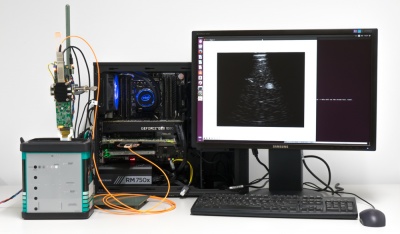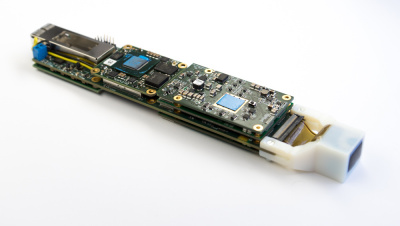Difference between revisions of "Digital Medical Ultrasound Imaging"
From iis-projects
(→Highlights of Past Projects) |
|||
| Line 3: | Line 3: | ||
[[File:Ultralight.jpg|thumb|400px|The Ultrasound Imaging System developed at IIS]] | [[File:Ultralight.jpg|thumb|400px|The Ultrasound Imaging System developed at IIS]] | ||
| − | + | At IIS, we are exploring the next generation of medical ultrasound imaging systems: | |
| − | + | * LightProbe: a programmable ultrasound transducer head, which incorporates the entire analog frontend and directly outputs the captured digital samples. This allows the LightProbe to be directly connected to any commodity hardware (phone, tablet, workstation) for post-processing over a standard digital link as simple as a standard peripheral, like a camera. | |
| + | * LightABVS: a high-end ultrasound probe, evolution of LightProbe, which incorporates 192 channels and communicates with a host PC via two 100G Ethernet optical links | ||
| + | * TinyProbe: a reduced number of channels (32), compact, wireless probe for wearable applications | ||
| − | + | Ultrasound systems have two main challenges: the high data-rates produced by the frontend (which need to be processed and transported off-head), and the power/thermal constraints of such devices. | |
[[File:LPf_v4.jpg|thumb|400px|Close-up of the digital ultrasound probe]] | [[File:LPf_v4.jpg|thumb|400px|Close-up of the digital ultrasound probe]] | ||
Revision as of 10:48, 26 October 2021
(scroll down for open projects)
At IIS, we are exploring the next generation of medical ultrasound imaging systems:
- LightProbe: a programmable ultrasound transducer head, which incorporates the entire analog frontend and directly outputs the captured digital samples. This allows the LightProbe to be directly connected to any commodity hardware (phone, tablet, workstation) for post-processing over a standard digital link as simple as a standard peripheral, like a camera.
- LightABVS: a high-end ultrasound probe, evolution of LightProbe, which incorporates 192 channels and communicates with a host PC via two 100G Ethernet optical links
- TinyProbe: a reduced number of channels (32), compact, wireless probe for wearable applications
Ultrasound systems have two main challenges: the high data-rates produced by the frontend (which need to be processed and transported off-head), and the power/thermal constraints of such devices.
This is an ongoing project at our lab and we are looking for motivated students to contribute on the following topics:
- Implementation of processing subunits: Hardware design FPGA/ASIC (VHDL/HLS)
- Programming of software functions: Microcontroller Programming / Processing system programming (C/C++/CUDA)
- System level design: Hardware software interactions, multi FPGA system, high bandwidth links (VIVADO/IP/HW-SW Codesign)
- Power/Thermal optimization: Modelling, Control, Task Scheduling (Matlab)
- Machine Learning (Python, FPGA)
- Ultrasond imaging algorithm development/improvements/tailoring for implementation (Matlab)
- PCB Design
If you are interested in any of the above topics, contact us.
Contents
Highlights of Past Projects
Open Projects
This is a fast-evolving project. If you are interested in this project and want to do something in the areas mentioned above, come to see us to discuss up-to-date project opportunities!
- Development Of An FPGA-Based Optoacoustic Image Reconstruction Platform for Clinical Applications
- Ultrasound measurement of microbubble stiffness for in situ detection of protease activity in clinical settings
- Skin Coupling Media Characterization For Fitness Tracker Applications (1 B/S)
- Integrating Ultrasound Technology into a Fitness Tracking Device (1M, 2 B/S)
- Adaptively Controlled Polarization And Hysteresis Curve Tracing For Polymer Piezoelectrics (1 S/B)
- Development Of A Test Bed For Ultrasonic Transducer Characterization (1 S/B)
- Ultrasound image data recycler
- Design of combined Ultrasound and PPG systems
- Improving datarate and efficiency of ultra low power wearable ultrasound
- Battery indifferent wearable Ultrasound
- Wearable Ultrasound for Artery monitoring
- Machine Learning for extracting Muscle features from Ultrasound raw data
- Automatic unplugging detection for Ultrasound probes
- Machine Learning on Ultrasound Images
- Visualizing Functional Microbubbles using Ultrasound Imaging
Projects in Progress
Completed Projects
- Ultrasound based hand gesture recognition
- Design of combined Ultrasound and Electromyography systems
- Ultra low power wearable ultrasound probe
- Machine Learning for extracting Muscle features using Ultrasound 2
- Ultrasound Low power WiFi with IMX7
- Ultrasound signal processing acceleration with CUDA
- Minimum Variance Beamforming for Wearable Ultrasound Probes
- Machine Learning for extracting Muscle features using Ultrasound
- Compression of Ultrasound data on FPGA
- LightProbe - 200G Remote DMA for GPU FPGA Data Transfers
- Time Gain Compensation for Ultrasound Imaging
- LightProbe - WIFI extension (PCB)
- LightProbe - Implementation of compressed-sensing algorithms
Contacts
If you are interested in the topic, please contact us: Sergei Vostrikov, Andrea Cossettini





